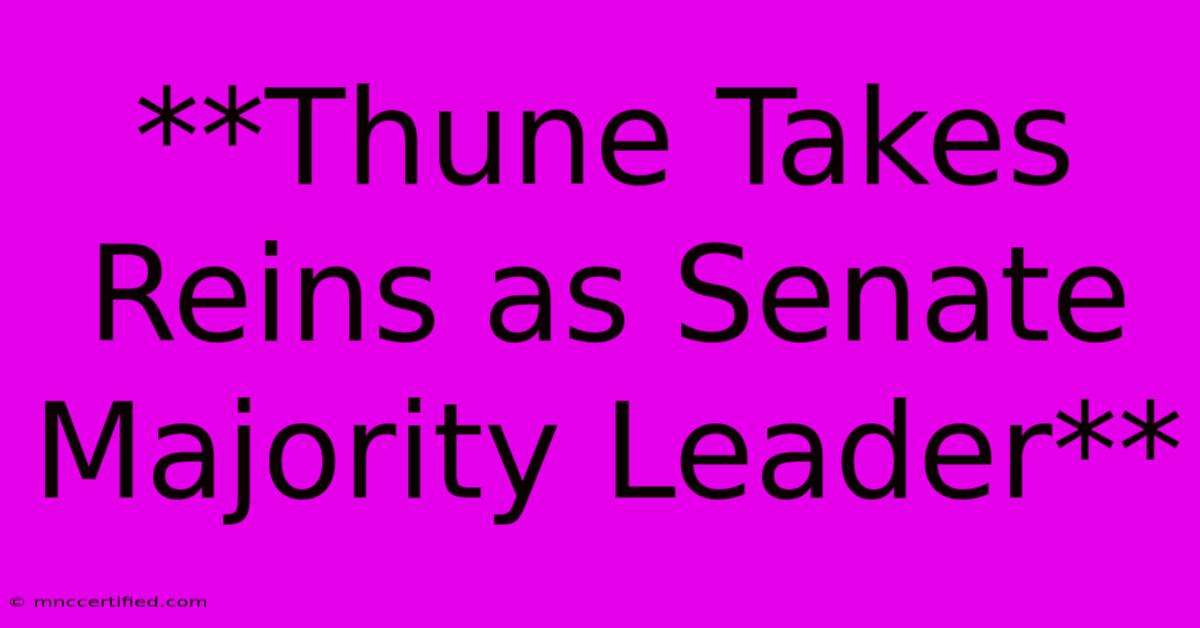**Thune Takes Reins As Senate Majority Leader**

Table of Contents
Thune Takes Reins as Senate Majority Leader: What It Means for the Future of American Politics
On January 3rd, 2023, Senator John Thune (R-SD) officially assumed the role of Senate Majority Leader, marking a significant shift in the dynamics of American politics. This transition, following the retirement of Senator Mitch McConnell, has sparked considerable interest and speculation about the future of the Republican Party and its legislative priorities.
Thune's Background and Rise to Power
Thune, a seasoned politician with a deep understanding of Senate procedures, has been a consistent voice in the Republican caucus for over two decades. He served as the Senate Republican Whip for several years, building strong relationships and gaining valuable experience in managing the legislative process. Thune's ascent to the leadership position signifies a generational shift within the Republican Party, signaling a new era focused on consolidating Republican power in the Senate.
Policy Priorities and Potential Legislative Agenda
While Thune has pledged to continue the Republican Party's focus on economic growth, national security, and limited government, his specific legislative agenda remains unclear. Many anticipate him to prioritize bills focused on:
- Energy independence: With the current global energy crisis, Thune may champion policies aimed at boosting domestic energy production and reducing reliance on foreign sources.
- Fiscal responsibility: Thune has consistently voiced concerns about the growing national debt, and his leadership may see renewed efforts to reduce spending and balance the budget.
- Regulatory reform: Republicans have long sought to streamline regulations affecting businesses and industries. Thune's leadership may translate into a renewed push for deregulation across various sectors.
However, the Senate remains a divided body, and any significant legislation will require bipartisan support. The path forward for Thune's agenda will heavily depend on the outcome of the upcoming 2024 elections and the composition of the Senate.
Thune's Leadership Style and Relationship with the President
Thune is known for his pragmatic approach and willingness to find common ground with Democrats. He has expressed a commitment to working across the aisle, indicating a potential for more bipartisanship in the Senate.
His relationship with President Biden remains to be seen, but Thune has indicated an openness to collaborating on areas of shared interest. However, fundamental ideological differences between the two parties may hinder progress on key issues like climate change, immigration, and healthcare.
Implications for the 2024 Elections
Thune's leadership may significantly influence the political landscape heading into the 2024 elections. His ability to successfully navigate the Senate and advance Republican priorities could boost the party's chances of retaining control of the chamber. Conversely, a perceived lack of progress or failure to deliver on key promises may galvanize Democratic voters and lead to a shift in the balance of power.
Conclusion: A New Era in the Senate
Thune's ascension to the Senate Majority Leader position represents a significant shift in the political landscape. His leadership style and policy priorities will shape the future of American politics in the coming years. While the exact course of his tenure remains uncertain, Thune's ability to navigate the complexities of the Senate and forge bipartisan consensus will be crucial for his success and the future direction of the Republican Party.
Keywords: John Thune, Senate Majority Leader, Mitch McConnell, Republican Party, Legislative Agenda, Energy Independence, Fiscal Responsibility, Regulatory Reform, Bipartisanship, President Biden, 2024 Elections, Senate Dynamics

Thank you for visiting our website wich cover about **Thune Takes Reins As Senate Majority Leader** . We hope the information provided has been useful to you. Feel free to contact us if you have any questions or need further assistance. See you next time and dont miss to bookmark.
Featured Posts
-
Get Free Doughnuts For Kindness Day
Nov 14, 2024
-
How Long To Keep Insurance Policies
Nov 14, 2024
-
Colonel Volleyball Senior Day Recap And Final Home Stand
Nov 14, 2024
-
Sixers Lose Despite Mc Cains Strong Play
Nov 14, 2024
-
Trump News Sends Dogecoin Toward 3 Year High
Nov 14, 2024